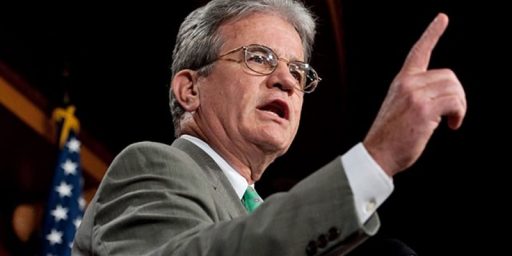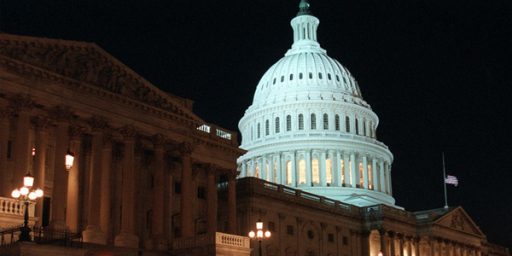Tom Coburn Rejects The GOP’s “No Tax Increases” Orthodoxy
An interesting moment during yesterday’s Meet The Press:
Sen. Tom Coburn (R-Okla.), arguably the most prominent fiscal conservative in the Senate, is declaring his independence from one of the country’s leading anti-tax groups, Americans for Tax Reform – and its fiery founder, Grover Norquist.
Coburn, a member of the “Gang of Six” bipartisan group working on a deficit reduction plan, said Sunday on NBC’s “Meet the Press” that he’d favor a “net” increase in tax revenue if it didn’t include hiking rates. He’d do so even if didn’t include a dollar-for-dollar match in spending cuts he agreed to when he signed a 2004 pledge to Norquist’s group.
“Which pledge is most important… the pledge to uphold your oath to the Constitution of the United States or a pledge from a special interest group who claims to speak for all American conservatives when, in fact, they really don’t?” Coburn asked. “The fact is we have enormous urgent problems in front of us that have to be addressed and have to be addressed in a way that will get 60 votes in the Senate… and something that the president will sign.”
“Where’s the compromise that will save our country?” he asked. “This isn’t about politics that is normal.”
Video:
Coburn is one of the first prominent Republicans to openly cross swords with Norquist and ATR in a long time, and he’s got the fiscal record to withstand any attack that Norquist might unlevel on him, not to say that Norquist isn’t going to try:
“The pledge that Tom Coburn signed was to the citizens of Oklahoma. He made that promise in campaigning for Senate in Oklahoma.
Coburn said on national TV today that he lied his way into office and will vote to raise taxes if he damn well feels like it, never mind what he promised the citizens of Oklahoma. Sen. Coburn knows perfectly well that the pledge is not to any organization but to the citizens of his state. He lied to them, not to Americans for Tax Reform.
Before this recent television comment, Coburn told me personally in a phone call that he would not vote for a tax increase and repeated his commitment in writing in a public letter to me.
The question, of course, is what a “tax increase” is. Is it an increase in tax rates, or is it tax reform that leaves rates the same but leads to higher es? The fact that Norquist can’t see the difference between the two suggests that he’s been blinded by his own orthodoxy.







If the change in policy leads to an increase in government revenues, somebody has to be paying more than they were in the past, and on the whole, everybody is paying more, since revenue has to come from somewhere besides a unicorn butt.
So, regardless of whether one believes it’s a good policy, it seems pretty reasonable to call it a “tax increase.”
An adult…talking about compromise…shocking. And he’s a Republican? Who’da thunk it?
Continued deficit spending is a far bigger threat to the country than higher taxes. I would prefer the reductions come in the form of spending cuts, but it should be obvious there isn’t sufficient public will to do this. The republican reaction to this should be trying to change the minds of the voters, not just acting like we got the cuts and continuing to borrow the country into oblivion.
Indeed, part of the reason it’s so hard to convince voters to support spending cuts is that Republicans have spent more than a decade shielding them from the consequences of voting for more spending.
And another reason is that Republicans have been systematically lying to the American people. They talk about cutting waste, fraud and abuse, never actual benefits to voters. And they invent bullsh*t economic theories that supposedly show tax cuts are self-financing.
Not bullshit, so much as misapplied. If you actually believe in supply side economics, the bush tax cuts were horribly designed, as most of them came in the form of credits that have no effect on marginal tax rates and were designed to encourage demand side behavior. There’s also the issue that it’s possible to believe the Laffer curve is a valid idea but to believe we may be below the peak rather than above it.
Much like the Democrats consistently misapply Keynes theories, the Republicans only really like to trot out supply side it can be easily distorted to rationalize what they already wanted to do. Neither side really understands the theory it spends most of its time backing.
You cannot cut spending enough to offset the debt…anymore than you can tax your way out of it. The Government is not a household and it is not a business. The solution lies in utilizing spending cuts and revenue increases and anyone who says different is a fiscal fraud.
I think every rational, informed person now acknowledges that we have to cut — real stuff, not smoke and mirrors — and raise taxes — and not just on the rich.
Unfortunately rational and informed are minority groups.
Unfortunately, there’s too many people who believe they can get a free lunch and too many politicians willing to campaign on giving it to them.
There can be no compromise with those who have caused our debt to grow at such a rate that it endangers our national security. The GOP that we sent to Washington in November need to stop the BS. The people do not compromise with Government.
@Zels
“There can be no compromise with those who have caused our debt to grow at such a rate that it endangers our national security.”
Your unemployment finally run out?
So where was this attitude during the Reagan years, eh?
In any event, if that’s the line he wants to play, I reject Coburn.
THe American people understand the situation. Why can’t Pols?
What the hell are you talking about, Bit? It’s not an attitude, it’s a question about logical reasoning. And whatever my attitude was during the Reagan years, it was in the Navy the entire time, spanning from Ford to Clinton.
I wasn’t speaking of just you, but whatever.
And no, it’s not a question of logical reasoning, but rather a question of operating from a set of principles… in this case of limited government. If Coburn is unwilling to apply those to this situation, to hell with him.